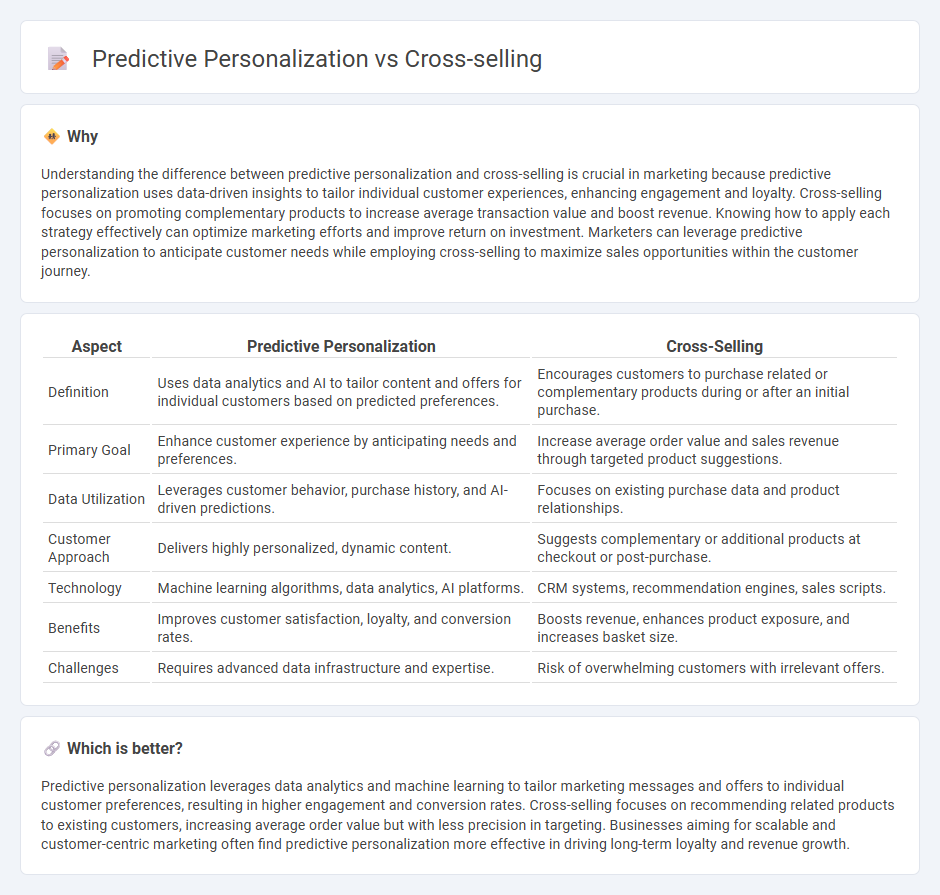
Predictive personalization leverages data analytics and machine learning algorithms to tailor marketing messages and product recommendations based on individual customer behavior and preferences, enhancing customer engagement and conversion rates. Cross-selling focuses on promoting complementary products or services to existing customers, increasing average order value and overall revenue. Explore in-depth strategies to optimize both predictive personalization and cross-selling for maximum marketing impact.
Why it is important
Understanding the difference between predictive personalization and cross-selling is crucial in marketing because predictive personalization uses data-driven insights to tailor individual customer experiences, enhancing engagement and loyalty. Cross-selling focuses on promoting complementary products to increase average transaction value and boost revenue. Knowing how to apply each strategy effectively can optimize marketing efforts and improve return on investment. Marketers can leverage predictive personalization to anticipate customer needs while employing cross-selling to maximize sales opportunities within the customer journey.
Comparison Table
| Aspect | Predictive Personalization | Cross-Selling |
|---|---|---|
| Definition | Uses data analytics and AI to tailor content and offers for individual customers based on predicted preferences. | Encourages customers to purchase related or complementary products during or after an initial purchase. |
| Primary Goal | Enhance customer experience by anticipating needs and preferences. | Increase average order value and sales revenue through targeted product suggestions. |
| Data Utilization | Leverages customer behavior, purchase history, and AI-driven predictions. | Focuses on existing purchase data and product relationships. |
| Customer Approach | Delivers highly personalized, dynamic content. | Suggests complementary or additional products at checkout or post-purchase. |
| Technology | Machine learning algorithms, data analytics, AI platforms. | CRM systems, recommendation engines, sales scripts. |
| Benefits | Improves customer satisfaction, loyalty, and conversion rates. | Boosts revenue, enhances product exposure, and increases basket size. |
| Challenges | Requires advanced data infrastructure and expertise. | Risk of overwhelming customers with irrelevant offers. |
Which is better?
Predictive personalization leverages data analytics and machine learning to tailor marketing messages and offers to individual customer preferences, resulting in higher engagement and conversion rates. Cross-selling focuses on recommending related products to existing customers, increasing average order value but with less precision in targeting. Businesses aiming for scalable and customer-centric marketing often find predictive personalization more effective in driving long-term loyalty and revenue growth.
Connection
Predictive personalization leverages customer data and machine learning algorithms to anticipate individual preferences, enabling marketers to tailor product recommendations effectively. This targeted insight drives cross-selling by identifying complementary products that align with consumers' interests, increasing the likelihood of additional purchases. Integrating these strategies enhances customer engagement, boosts conversion rates, and maximizes revenue through personalized marketing campaigns.
Key Terms
Upselling
Cross-selling involves recommending complementary products to increase cart value, while predictive personalization uses data-driven insights to tailor upselling strategies based on customer behavior and preferences. Upselling techniques supported by predictive analytics enhance customer experience by offering relevant premium options, leading to higher conversion rates and increased revenue. Explore how integrating predictive personalization can transform your upselling approach for maximum impact.
Customer Segmentation
Cross-selling leverages customer segmentation by identifying complementary products tailored to specific buyer groups, enhancing sales opportunities within established segments. Predictive personalization employs advanced data analytics and machine learning to forecast individual customer preferences, enabling hyper-targeted recommendations beyond traditional segmentation boundaries. Explore how combining these strategies can transform your customer engagement and increase revenue.
Recommendation Algorithms
Recommendation algorithms in cross-selling leverage customer purchase history to suggest complementary products, enhancing average order value and customer retention. Predictive personalization employs machine learning to forecast individual preferences and behaviors, offering highly tailored product recommendations that increase conversion rates. Explore in-depth how these advanced recommendation algorithms redefine customer engagement and drive sales growth.
Source and External Links
What Is Cross-Selling? Intro, Steps, and Pro Tips [+Data] - Cross-selling is offering customers extra products or services that complement their original purchase, such as suggesting fries and a drink when a customer orders a burger, which increases sale value and customer satisfaction.
Cross-Sell - Overview, How It Works, and Examples - Cross-selling refers to selling an additional product or service related to the primary purchase, often viewed as a key method to increase revenue and strengthen customer relationships across industries.
What is Cross-Selling? - Cross-selling is a growth strategy focused on selling related products or services that increase customer loyalty and lifetime value without replacing existing purchases, thereby improving sales and customer satisfaction.
 dowidth.com
dowidth.com